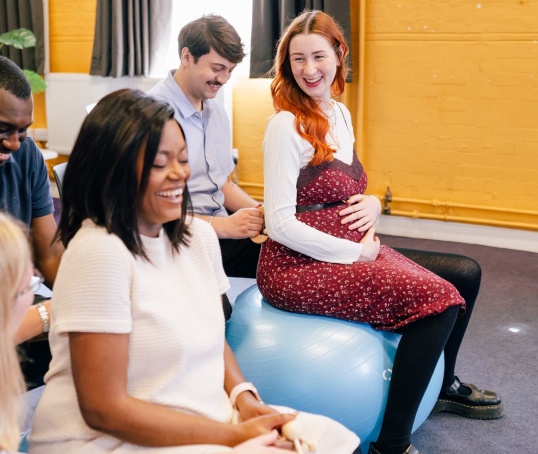Birth partners can help a woman or birthing parent feel supported during labour and birth and make the birth experience more positive (Hoffman et al, 2023). Find out why they’re important and what they can do.
What is a birth partner?
A birth partner or partners is someone who can provide continuous support during labour and birth. They can provide company, advocacy and encouragement, as well as fulfilling practical tasks like getting snacks and drinks and helping with pain management tools.
They could be the woman or birthing parent’s partner or co-parent, or a friend or family member. A professional doula is also a birth partner. Our NCT Doulas can provide continuous support through pregnancy and birth.
Why someone might benefit from a birth partner or doula
The simple fact of having a friendly and familiar face can put the pregnant woman or person at ease. Although a midwife will be present, in a hospital it is likely that they will be looking after more than one labouring woman or person at a time.
The midwife role means they are also focused on monitoring the birth, keeping records, and may begin or end work shifts in the middle of labour. So a birth partner or doula may be better placed to provide continuity.
Women or birthing people who have continuous support in labour are more likely to (Bohren et al, 2017; Hoffman et al, 2023):
- Have a spontaneous vaginal birth with fewer interventions
- Experience a shorter labour
- Have a more positive birth experience
- Have better postnatal mental health
And are less likely to:
- Report negative feelings about their childbirth experience
- Use pain management
- Have an unplanned caesarean birth or assisted vaginal birth
- Have a baby with a low APGAR score
- Develop postnatal depression
What does a doula or birth partner do?
Research shows that birth partners need to be compassionate and trustworthy. They support women and birthing people in a variety of ways (Bohren et al, 2019):
- Providing information, bridging the gap between them and healthcare staff
- Speaking up in support of the woman or birthing person
- Practical support such as helping them move around, or providing massage
- Emotional support, through continuous presence, praise, and reassurance
Birth partners cannot legally make decisions or consent on behalf of the woman or birthing person at any time (Birthrights, no date).
Tips for birth partners
Be prepared (NHS, 2023):
- Read or help write the birth plan.
- Ask what kind of supporter the woman or birthing person wants – hands on, or quiet companionship?
- Consider how the birth partner role might change if plans change
- Help pack the hospital bag so you know where things are
- Pack your own bag
- Get familiar with any equipment or labour aids you plan to use, and make sure they’re packed
- Prepare snacks for everyone and things to do in labour
- Even if planning a home birth it’s good to know the route to hospital and how you’ll get there
During labour, birth partners can support the pregnant woman or person by (NHS, 2023):
- providing distraction between contractions in the early stages
- providing calm company as things get more intense
- setting up any equipment
- listening to them
- praising, encouraging or comforting with loving words
- providing snacks, water or isotonic drinks
- helping with the pain management techniques they plan to use – e.g. using a TENs machine, breathing exercises or hypnobirthing
- helping them move and change position
- building a teamworking relationship with the health professionals, and referring to the birth plan. Relaying any changes in behaviour as labour progresses
- advocating, supporting decisions, and protecting from intrusions
- tending to them, with comfort, hand-holding, or massage
- dealing with questions from other family members (although the role of the birth partner shouldn't be to look after children in a home birth, someone else will be needed for this)
- giving the woman or birthing person space if needed
- managing their own needs for food and drink, rest and toilet breaks
How can I be an effective birth partner?
Birth partners are most helpful when they are fully present and acting as an advocate. They can help the pregnant woman or person by reinforcing what has been learnt in antenatal classes (Sutcliffe et al, 2023).
Research has shown that birth partners who did not apply techniques learned in antenatal classes were more likely to describe themselves as feeling helpless. They were more unsure of the support they could provide during labour and birth (Sutcliffe et al, 2023).
It is very important for birth partners to feel ready for the experience. They also need recognition and support for their role from maternity services (Johansson et al, 2015; Schmitt et al, 2022; Sutcliffe et al, 2023). When birth partners feel valued and supported, they can better support the mother or birthing parent. This is more satisfying for everyone (Evans et al, 2023).
Attending our NCT Antenatal classes can help both the birth partner and pregnant woman or person feel prepared for labour and birth. It can also help the birth partner learn more about their role.
What are the challenges for birth partners?
The hospital environment is not always designed to be inclusive of birth partners, which can create a conflict between feeling needed but not belonging (Harte et al, 2016). For some this is a good reason to birth at home or in a midwife-led unit.
Research shows that birth partners who coped well with labour felt they had a defined role and were well prepared to provide support. They also built a trusting relationship with the healthcare professionals (Evans et al, 2023).
Some birth partners felt that health professionals didn’t value their role, and there were barriers to being involved in the care and decision-making (Bohren et al, 2019). For LGBTQIA+ parents this included a lack of recognition for the co-parent status (Evans et al, 2023).
Research on father’s experiences has reported them feeling vulnerable and stressed in an unfamiliar situation. They may be overwhelmed by the intensity of labour and birth. Good emotional support and information from midwives and medical staff helped them be actively involved and experience the birth positively (Johansson et al, 2015; Schmitt et al, 2022).
No-one should feel pressurised to be a birth partner. It’s important to discuss any expectations and concerns, and accept that not everyone is well suited to the role (Johansson et al, 2015).
Further information
Birthrights has more information about your rights around birth partners.
Birthrights (no date) Birth partners. https://birthrights.org.uk/factsheets/birth-partners/ [17 Oct 25]
Bohren MA, Berger BO, Munthe‐Kaas H, Tunçalp Ö. (2019) Perceptions and experiences of labour companionship: a qualitative evidence synthesis. Cochrane Database of Systematic Reviews, Issue 3. Art. No.: CD012449. https://doi.org/10.1002/14651858.CD012449.pub2
Bohren MA, Hofmeyr GJ, Sakala C, Fukuzawa RK, Cuthbert A. (2017) Continuous support for women during childbirth. Cochrane Database of Systematic Reviews, Issue 7. Art. No.: CD003766. https://doi.org/10.1002/14651858.CD003766.pub6
Evans K, Pallotti P, Spiby H, Evans C, Eldridge J. (2023) Supporting birth companions for women in labor, the views and experiences of birth companions, women and midwives: A mixed methods systematic review. Birth. 50: 689-710. https://doi.org/10.1111/birt.12736
Harte JD, Sheehan A, Stewart SC, Foureur M. (2016) Childbirth Supporters’ Experiences in a Built Hospital Birth Environment: Exploring Inhibiting and Facilitating Factors in Negotiating the Supporter Role. HERD: Health Environments Research & Design Journal. 9(3):135-161. https://doi.org/10.1177/1937586715622006
Hoffmann, L., Hilger, N., Riolino, E. et al. (2023) Partner support and relationship quality as potential resources for childbirth and the transition to parenthood. BMC Pregnancy Childbirth 23, 435. https://doi.org/10.1186/s12884-023-05748-6
Johansson M, Fenwick J, Premberg A (2015) A meta-synthesis of fathers׳ experiences of their partner׳s labour and the birth of their baby, Midwifery, Volume 31, Issue 1, pp 9-18. https://doi.org/10.1016/j.midw.2014.05.005
NHS (2023) Tips for your birth partner. https://www.nhs.uk/pregnancy/labour-and-birth/what-happens/tips-for-you… [6 Oct 25]
Schmitt, N., Striebich, S., Meyer, G. et al. (2022) The partner’s experiences of childbirth in countries with a highly developed clinical setting: a scoping review. BMC Pregnancy Childbirth 22, 742. https://doi.org/10.1186/s12884-022-05014-1
Sutcliffe KL, Dahlen HG, Newnham E, Levett K (2023) “You are either with me on this or not”: A meta-ethnography of the influence birth partners and care-providers have on coping strategies learned in childbirth education and used by women during labour, Women and Birth, Volume 36, Issue 4,e428-e438 https://doi.org/10.1016/j.wombi.2023.02.001




